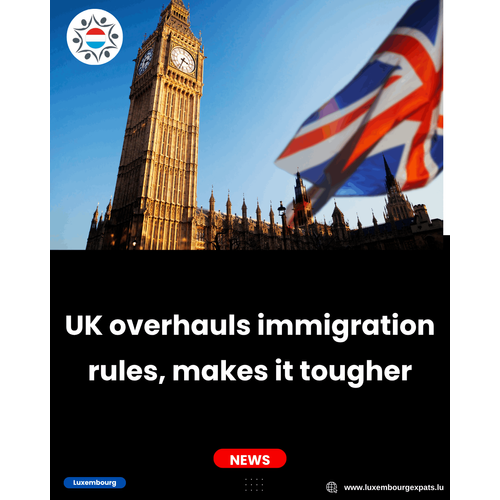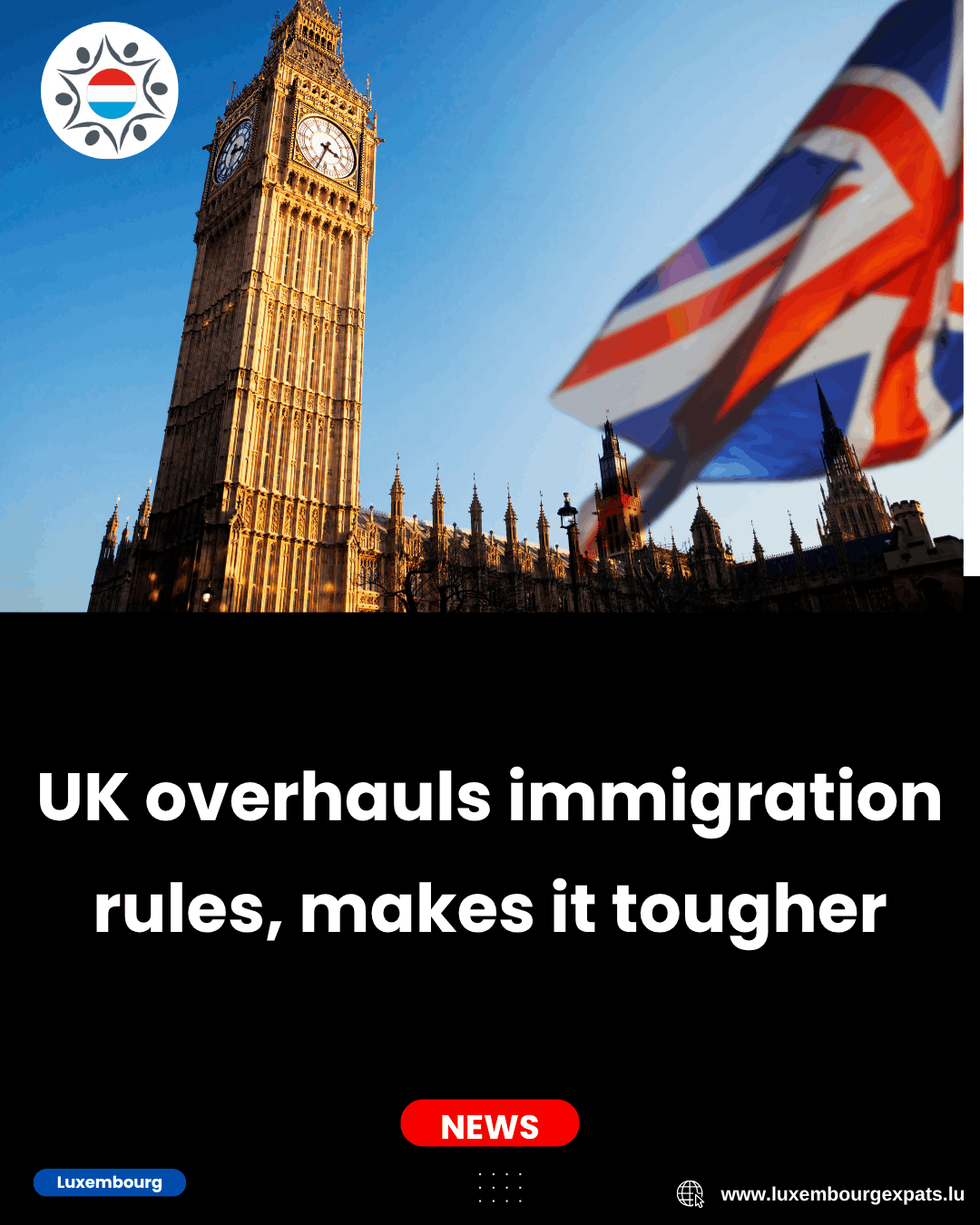UK Immigration Overhaul: Comprehensive Guide to New Rules for Global Migrants
LuxembourgPosted on 29 July 2025 by Team · 6 min readThe United Kingdom has enacted a transformative set of immigration reforms, effective from July 22, 2025, aimed at reducing migrant numbers and prioritizing British workers. These changes, coupled with proposed measures still under consultation, create significant challenges for international professionals, students, and families seeking to relocate. With tightened job eligibility, higher salary thresholds, stricter family visa rules, and extended residency timelines, the UK’s immigration landscape is more complex than ever. This comprehensive guide outlines the key changes, their implications, and actionable steps for prospective migrants.
Immediate Changes: Job Bans, Salary Hikes, and Shrinking Opportunities
As of July 22, 2025, the UK Home Office has implemented far-reaching restrictions:
- Care Worker Ban: Overseas recruitment for care workers is now prohibited. Existing sponsored care workers in the UK are unaffected, but new applicants can no longer enter this sector, closing a significant pathway for medium-skilled migrants.
- Skilled Worker Visa Restrictions: The list of sponsor-eligible jobs under the Skilled Worker Visa has been drastically reduced. Many medium-skilled roles (RQF levels 3–5, such as administration, hospitality, or technical support) are no longer eligible unless granted specific exemptions. Only high-skilled roles, typically requiring advanced qualifications or specialized expertise, remain broadly accessible.
- Increased Salary Thresholds: The minimum salary requirement for Skilled Worker Visa applicants has risen significantly. As of 2025, the general threshold is £38,700 (up from £26,200), with some roles requiring even higher salaries depending on the occupation. This change prices out many medium-wage professions, making sponsorship harder to secure.
These measures reflect the UK’s push to prioritize domestic labor and reduce reliance on foreign workers in a tightening job market.
Family Visa Restrictions: Tougher Rules for Dependents
The reforms also impact families planning to relocate:
- Higher Income Requirements for Family Visas: Sponsors bringing dependents (spouses, partners, or children) must now meet a minimum income threshold of £29,000 per year (previously £18,600), with additional income required for each dependent. This applies to both UK residents sponsoring family members and migrants applying to bring dependents.
- Stricter English Proficiency for Dependents: Dependents of visa holders must now demonstrate higher English language proficiency, typically at CEFR Level B1 or above, for speaking and listening. This requirement extends to spouses and partners, complicating family reunification.
- Limits on Dependent Eligibility: Only immediate family members (spouses, civil partners, unmarried partners with a two-year cohabitation history, and children under 18) qualify as dependents. Extended family members, such as parents or siblings, face near-impossible barriers under the new rules.
These changes make it costlier and more complex for migrants to bring families, particularly for those in lower-wage or medium-skilled roles.
Proposed Changes: What’s Under Consultation?
Several additional reforms, still under review, could further reshape the UK’s immigration system:
- Extended Residency Timeline: The path to permanent residency (Indefinite Leave to Remain) may double from five to ten years. An “earned settlement” pathway could allow earlier settlement for exceptional cases, but eligibility criteria—potentially tied to high earnings, critical skills, or economic contributions—remain undisclosed.
- Student Visa Overhaul: A proposed levy on international student tuition could increase costs for overseas students by up to 10%, depending on the institution. The Graduate Visa, which allows post-study work, may be reduced from two years to 18 months, limiting opportunities to gain UK work experience.
- Higher English Proficiency Standards: Visa applicants, including those on Skilled Worker and Student Visas, may face stricter language requirements, potentially at CEFR Level B2 or higher. This would affect both primary applicants and their dependents.
- Reduced Family Visitor Visas: Proposals to tighten visitor visa rules could limit short-term family visits, with stricter proof of intent to return and financial self-sufficiency required.
These proposals, if approved, will make the UK a less accessible destination for education, work, and family reunification. Final decisions are expected by late 2025 or early 2026.
Impact on Global Migrants
The reforms affect a wide range of prospective migrants:
- Professionals in Care and Medium-Skilled Roles: The care sector ban and reduced sponsorship list eliminate opportunities in fields like healthcare support, retail management, and technical trades. Only high-skilled roles, such as engineering, IT, or medicine, remain viable for most applicants.
- Families: Higher income and language requirements make it harder to bring spouses, partners, or children. Families with limited financial resources or non-English-speaking dependents face significant barriers.
- International Students: Rising tuition costs and a shorter Graduate Visa reduce the UK’s appeal as a study destination. Students aiming to transition to work visas post-graduation will face a narrower window to secure employment.
- Long-Term Settlers: The potential ten-year residency timeline delays citizenship and permanent settlement, impacting life plans like home ownership or family planning.
For migrants already in the UK, uncertainty surrounds whether the extended residency timeline will apply retroactively. Current visa holders should prepare for stricter renewal criteria and higher salary thresholds.
Legislative Process: How Are These Rules Enacted?
Most immediate changes, including job sponsorship cuts, salary increases, and visa eligibility updates, are enforced through Home Office rule amendments, which do not require parliamentary approval. However, major proposals—such as the tuition levy, residency timeline extension, and family visa reforms—need full legislative votes, potentially delaying implementation but not diminishing their impact. Ongoing consultations will shape the final scope of these changes, with outcomes expected by early 2026.
The UK’s immigration overhaul signals a strategic shift toward a high-bar, selective migration system. By prioritizing highly skilled workers, reducing student benefits, and tightening family and settlement pathways, the government aims to control migration while bolstering local employment. For global migrants, the UK remains a hub for opportunity, but the barriers to entry are steeper. Higher costs, stricter criteria, and longer waits demand careful planning and adaptability.
Actionable Steps for Prospective Migrants
To navigate the new rules, prospective migrants should:
1. Consult Immigration Experts: Engage a registered immigration adviser to assess eligibility and strategize applications under the new rules.
2. Target High-Skilled Roles: Focus on professions like engineering, IT, healthcare (excluding care workers), or finance, which remain eligible for sponsorship and meet salary thresholds.
3. Prepare Financially: Ensure income meets the £38,700 Skilled Worker Visa threshold or £29,000 family visa requirement, with additional funds for dependents.
4. Enhance Language Skills: Invest in English proficiency training to meet B1 (for dependents) or B2 (for primary applicants) standards, using recognized tests like IELTS or TOEFL.
5. Monitor Policy Updates: Track consultation outcomes via official UK government websites or trusted news sources, particularly for residency and student visa changes.
6. Plan for Education Costs: Budget for potential tuition increases and explore scholarships or funding to offset the proposed student levy.
7. Evaluate Alternatives: Consider other destinations, such as Canada or Australia, which may offer more accessible migration pathways for certain professions or students.
The UK’s reforms reflect global trends toward tighter immigration controls, driven by economic and political pressures. While the UK remains a magnet for talent and education, its new policies favor high earners, highly skilled professionals, and self-sufficient students. For migrants worldwide, success in the UK now hinges on preparation, financial stability, and alignment with the country’s evolving priorities.
Join the Luxembourg Expats network luxembourgexpats.lu
I am your contact
Team
Chat








